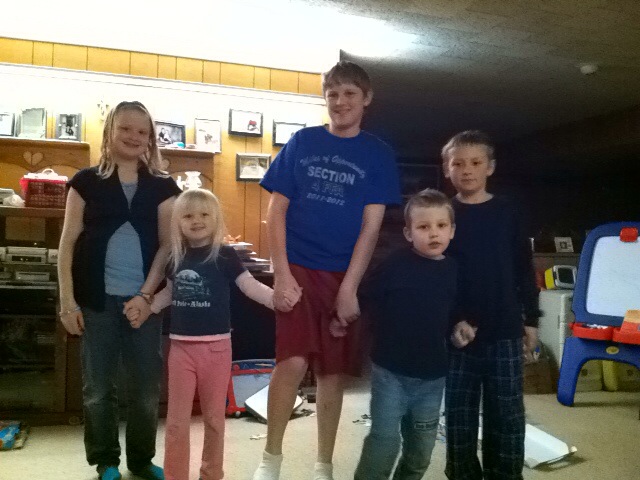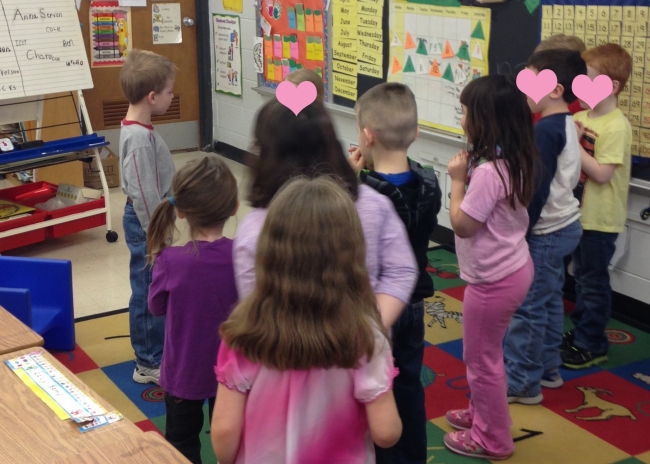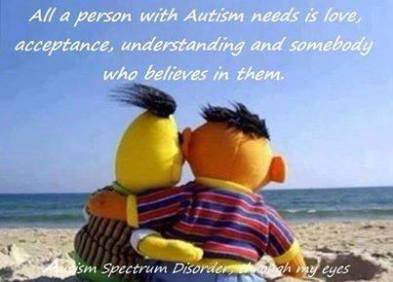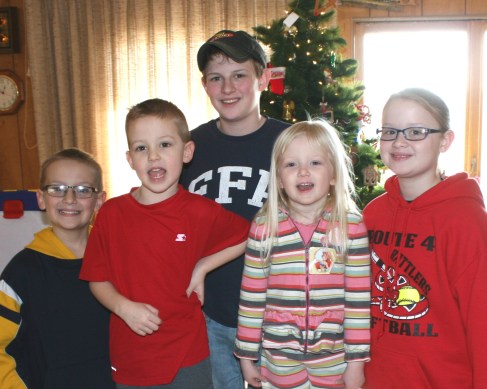Going Blue for Ben
I don’t know when I started associating colors with special days, but for as long as I can remember, orange and black have meant Halloween in my brain. Brown, orange, and yellow make me think Thanksgiving. Red and green trigger thoughts of Christmas. Red, pink, and even purple in recent years, point my mind to Valentine’s Day and I’ve noticed a great many people wear green on St. Patrick’s Day. Now, there’s blue on World Autism Awareness Day.
Wednesday, April 2 was established as World Autism Awareness Day (WAAD) by the United Nations General Assembly on December 18, 2007 to raise awareness of autism in all levels of society. (www.theun.org) This UN resolution declares WAAD as one of only four official health-specific United Nations Days and will bring the world’s attention to autism, a pervasive disorder that affects tens of millions. The World Autism Awareness Day resolution encourages all Member States to take measures to raise awareness about autism throughout society and to encourage early diagnosis and early intervention. It further expresses deep concern at the prevalence and high rate of autism in children in all regions of the world and the consequent developmental challenges. (www.autismspeaks.org)
We knew early on in our son’s life that something was different about him compared to his older siblings. I can’t recall how many times the conversations at home included phrases like, “You’ll never guess what Ben did today. It wasn’t necessarily anything wrong, just different.” Even routine checkups at the doctor lead to comments like, “Wow, I’ve never seen that before….It’s not wrong, just different.” And each time, while I held on to the “It’s not wrong,” my heart broke a little deeper with the addition of, “different.”
But different isn’t wrong. Different isn’t bad. Different is, well, different. Different was never used in context to determine a measure of the same quality or character as defined by http://www.dictionary.com, but rather the degree of similarity. The kids were and continue to be different: dissimilar, not identical. Aren’t we all, then, different? Even identical twins typically have quite differing personalities, neither one better or more valued than the other, just different from one another.
As we grew into our role of being a spectrum family, we all subconsciously took to the task of spreading awareness. I don’t recall ever having a family meeting with the older kids and laying out guidelines for how we would tackle life, we just did it. We are a family and to us, that means we stick together and support one another. I saw our older children begin to share their story with their peers. “My brother has autism.” “It’s okay, loud noises scare him. He’s not hurt or angry, just a little scared. He’s okay, he just has autism.” Awareness was happening before my very eyes. Understanding came, too, as their peers spent time around him.
I recall walking into the school to assist with a project in our twins’ classroom last year. It was in the afternoon, which meant I had both younger kids in tow. Ben was met with “Hey, Buddy!” and high fives up and down each row. We had moved on to acceptance. Once again using http://www.dictionary.com, check out this definition of being accepted: generally approved; usually regarded as normal, right, etc.
That seemed good enough to this mom’s heart at the time, but then he got into kindergarten where the challenges branched into the academic realm. Kindergarten, you might say, is a walk in the park: writing letters, sorting colors, counting bears, beginning to read. These all take a great deal of work, especially for a child on the spectrum, especially when the most difficult task is simply to stay focused. Sometimes, a child, any child, needs to release the stress that has been put on their systems – adults, too for that matter. Some handle stress better than others. Some release it through a run around the playground, some through quiet time with a good book, some through laughter – shrieks of giddy laughter. This is our boy: running and high-pitched shrills of laughter.
Not everyone sees this as a good thing, especially a substitute bus driver at the end of a seemingly long route on a seemingly long day. I can somewhat relate. The laughter can sometimes seem to cut right through the air and pierce the eardrums. When this happened on the bus ride home one day, the substitute bus driver very loudly demanded to know, “Who is screaming!?!?!?!”
I cringed as I heard our oldest daughter relate the story that afternoon, wondering what kind of battle lie ahead. Much to my surprise, the story ended quite differently than I expected.
A sweet little classmate of Ben’s stood to his defense and said, “That’s Ben. He’s different than us, and THAT’S OK!”
Enough said. The bus driver smiled and said, “Ok. Please try to be a little more quiet.”
That substitute bus driver is no longer in our area, but I’m betting he’ll never forget the day he was schooled by a kindergartner. I’m hoping he, and everyone on the bus that day, will carry the memory of the exchange with them for years to come. And I hope the kids my son shares so much of his day with will continue to come to his side when he is questioned. His classmate was aware that he is different. She understood that he is different. She accepted that he is different, even so much as demanded that the bus driver accept him as well, in so much as a sweet little kindergartner could demand. But she did it with a smile on her face and love for her friend, our boy, in her heart. She valued, supported, and celebrated our boy as she stood with him against the one who seemed angry about Ben being Ben. This little girl will forever be one of my heroes.
This is what it means to stand with us: to be aware, to understand, to accept, and to celebrate. Won’t you join us on Wednesday, April 2, by wearing blue to show you stand with us? I’m not asking you to donate to any one organization, but simply to stand with us and our son.
The colors of autism are red, yellow and blue. The symbol of autism is a puzzle piece, to reflect the mystery and complexity of the disorder and to represent the diversity of people and families living with the disorder. Blue, however, is the color chosen by Autism Speaks, the world’s leading autism science and advocacy organization, (www.autismspeaks.org) and has long been identified with the disorder. So every year on April 2, you’ll see us sporting our Blue for Ben. Won’t you join us?
“FEAR IS A DISEASE. HOPE IS ITS ONLY CURE.” – Star Wars, The Clone Wars
I am married to and have birthed Star Wars fans. My brother would have been so proud.
I never truly “got it”, but I have always enjoyed hearing the excitement shared between my favorite guys, and have been secretly glad that these were movies, rather than a television series which would seemingly go on forever. And then it happened. It: Star Wars, The Clone Wars. But without cable, I thought my girls and I were safe. Wrong again, enter Netflix.
I say this all in gest because of course, I love to see my guys happy. However, there’s only so much of clone wars a girl can take. Yet, when I happened to take a glance at the tv when an episode began this weekend, I found myself totally taken by surprise. Our oldest had assured me there were good life lessons to be learned here, but I hadn’t invested the time to check it out and yet, here it was: “Fear is a disease. Hope is its only cure.”
Wow. Who knew I’d stop on a dime due to anything Star Wars related? After all, I had yet to see Yoda here.
We all experience life differently. We have different situations, different expectations, different dreams, different goals, different emotions, different everything. Yet, we all have fears of some sort or another, and by the grace of God, we can all have hope.
My fears likely look very different from yours, but hope pops up in the quiet and sometimes not-so-quiet moments every day. Each time our boy looks in my eyes and holds the eye contact even for just a couple of seconds, I have hope that next time it will be a little longer. Every time I get a picture from his classroom aide and see that precious smile, I have hope that our boy will continue to thrive in the academic and social atmosphere in which he spends so many hours of his day. When I get a phone call from our daughter in the morning saying she can’t get Ben off the bus, she hands him the phone and he tells me what is wrong and we have a real conversation, I have hope that he will continue to develop his ability to converse and interact in social situations, not only with us, but with his peers as well.
(Ben leading an impromptu session of “If You’re Happy & You Know It” in his kindergarten classroom. 3/2014)
Yes, I have a great deal of hope. And each day, it seems to squash the disease of fear a little smaller.
One Piece of Advice?
Someone recently asked me, “If you could give a parent whose child had just been diagnosed with an Autism Spectrum Disorder just one piece of advice, what would it be?”
You might think this would be an easy question. After all, we’ve been there. We’ve lived the moment you can hardly breathe. We survived the reality of a kick in the gut, even when deep down, before they even said the words, we knew that we knew that we knew, what we were being told was true. So, it took me a bit to respond.
Once I got past the lump in my throat, the one that comes back every single time I’m asked to mentally go back to our diagnosis day, this is what I said: “Breathe and love on your child. When the dust settles, those will be the two things you realize you did without thinking…well, you may have needed to remind yourself to breathe, but that’s okay. Loving your child is the easy one. Keeping his/her needs forefront will allow you to see what you need to do in your situation. Every child is different. Realize that what worked for one child may not work for yours, and know that that is okay. You will find what works. Breathe. Love. Never Give Up.”
I have thought through this more times than I can recall since that conversation and the thing that hits me most is that this is true not only for parents of kids on the spectrum, but for all parents. When our neuro-typical teenager reminds me of myself in my teen years, I remind myself to breathe and love him. When our middles pull junior high shenanigans, I remind myself to breathe and love them. When our littlest little spouts off a bit of sassiness that even turns our spectrum boy’s head, I remind myself to breathe and love her. This is what parents do.
It reminds me of a graphic I saw on facebook earlier this week.
Bert and Ernie (two favorites of the Janssen Family) were sitting on the beach. Superimposed on the picture were the words, “All a person with autism needs is love, acceptance, understanding and someone who believes in them.” While I agree this, I think you could easily delete “with autism” and it would be just as true. See, we are all people first.
On Having a Brother with Autism
There are times I look at our kids as a whole group and marvel at the ways God has blessed us with this brood. I think every parent does this from time to time. I hope every parent does this from time to time.
As a spectrum family, we have variables others know nothing about and can’t begin to comprehend even when we try to explain them. Some things just have to be experienced to be understood. I think this is true for every family, spectrum or not, special needs or not. At the core of our family, is a deep-rooted love for the ones with whom we are blessed to share our lives.
I often wonder if our neuro-typical (non-autistic) kids feel slighted at all simply because there are times we need to put our focus on Ben and help him understand whatever it is that we are facing. It could be as simple as a change in plans because of bad weather or as complex as difficult homework. There are times that Ben has to come first.
We are in a busy season of our lives due to our big three being involved in FFA, 4-H, our church youth group, our church kids’ club, and the school production of Beauty & The Beast. These are exciting times and ones I’m so glad our kids have the opportunity to enjoy, but they do make for some busy weeks. Despite the busyness and the miles, these are the moments I feel like our kids get to be kids, and for that I am ever so thankful. Not everything in their lives needs to be about autism. Yes, our lives are enriched by autism, but it is not our entire life. We tend to focus on the person our son is, rather than his condition.
Still, I sometimes wonder how the other kids process this reality in their lives. I asked a simple question this past weekend, four different times, once for each of our “typicals”.
So, what’s it like to have a brother with autism?
- It’s difficult in a fun sort of way. You never know what’s coming around the next corner, but it’s always an adventure.
- There’s more responsibility. You watch out for him more than others because you don’t want him getting hurt or anyone else getting hurt because he gets mad. Sometimes he squeezes or hits or pushes to get rid of his stress. (This is not to hurt anyone or even because he’s necessarily angry or mad, but because he can’t always process everything going on around him. Sometimes, there’s just too much – too much noise, too much light, too many people, too much chaos – it’s too much for his sensory system to process. It’s similar to a fight or flight situation. There’s too much going on around me that my brain, my systems, can’t process and make sense of. I can’t escape so I have to fight it off. This is something we continue to work on and thankfully an area in which we have seen great progress.)
- Well, it’s fun to have Ben for a brother, but I wish a doctor could find some medicine to get rid of his autism so he wouldn’t need so much help. But, it’s okay that he needs help because you (mom and dad) can help him and sometimes I can help him, too.
- Having a brother with autism is hard. He doesn’t understand everything, so you have to explain it in the most basic form. It’s hard when his schedule gets messed up; he doesn’t understand. But, it’s not all just bad. When he’s having a good day, like usual, he can play a game with you and have conversations. He’s not strange or weird, he’s unique. He is autism: always unique, totally interesting, sometimes mysterious.
I love that our kids can recognize that it’s okay to be different. They don’t pass any judgments on him and they are quick to take a stand for him. Their love for and investments into their brother also affect those around them. I have been blessed to witness friends of theirs doing the same. Yes, we have an amazing little man who puts us on the spectrum, but he has some pretty amazing siblings with whom he gets to ride out this adventure!
*****
(Answers to the question, “So, what’s it like to have a brother with autism?” were gathered from our neuro-typical kids ages 4, 11, 11, and 15, and shared with their permission, in no particular order.)




